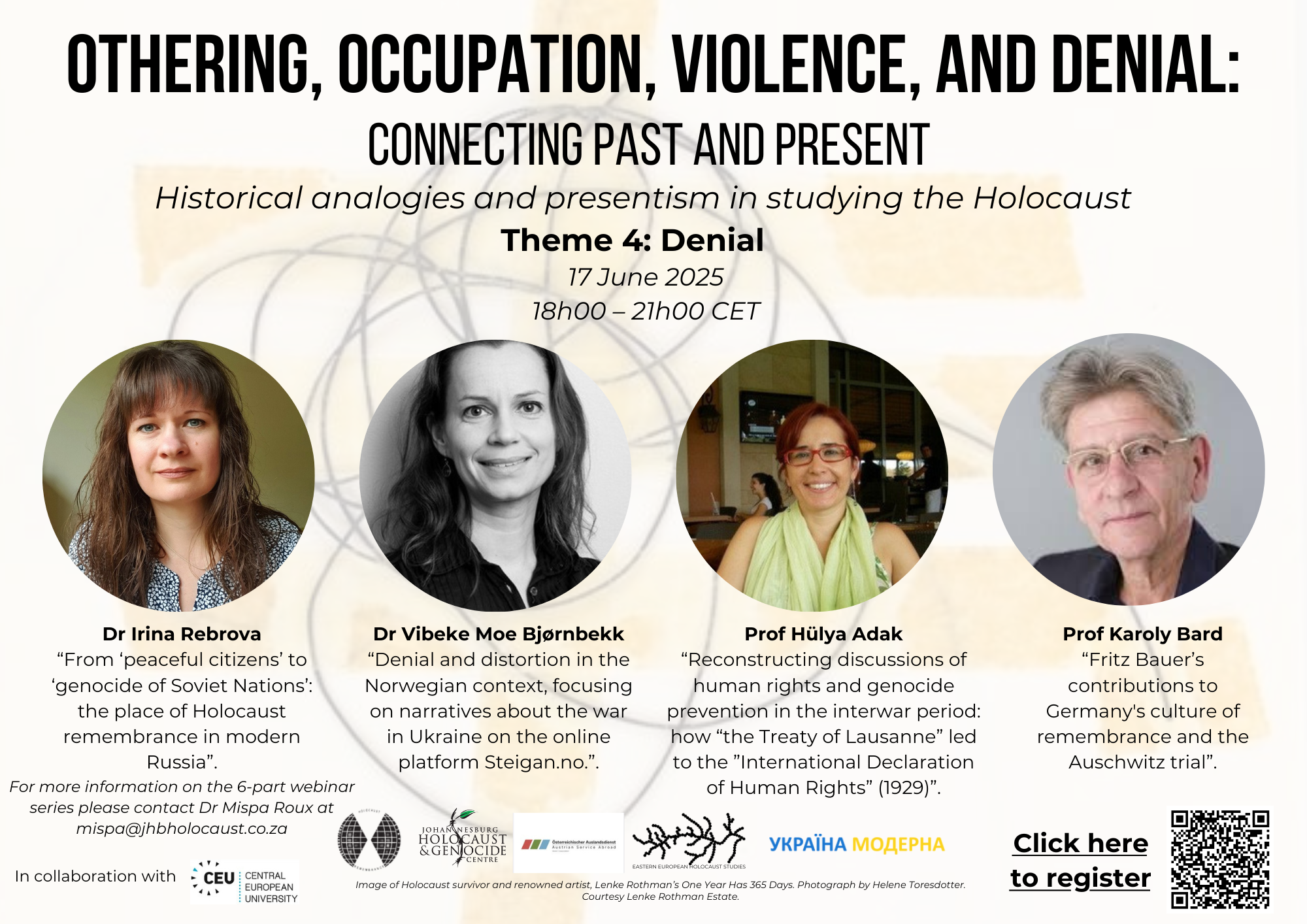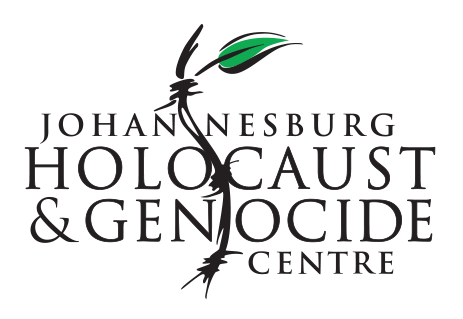17 June 2025 @ 6:00 pm – 9:00 pm
INTERNATIONAL HOLOCAUST REMEMBRANCE ALLIANCE GRANT PROGRAM WINNER 2023

Join us for the IHRA Webinar Series, in collaboration with the Johannesburg Holocaust & Genocide Centre (JHGC), Eastern European Holocaust Studies: Interdisciplinary Journal of the Babyn Yar Holocaust Memorial Center (EEHS), Ukraina Moderna website (UM), and Austrian Service Abroad (ASA) on the theme of “Othering, Occupation, Violence, and Denial”. Topics that will be engaged with under the central theme include the way in which historical analogies and presentism in studying the history of the Holocaust are used to foster deeper understanding and critical thinking about the Holocaust, current armed conflicts and the rise of hate speech. Ways in which oversimplifications, misrepresentations, distortions, and denial of these topics can be challenged and safeguarded against will also be grappled with, alongside testimonies, resistance, education, remembrance, and the collection and preservation of history.
This four webinar in the series deals with the theme of Denial featuring speakers: Dr Irina Rebrova on “From ‘Peaceful Citizens’ to ‘Genocide of Soviet Nations’: The Place of the Holocaust Remembrance in Modern Russia”, Dr Vibeke Moe Bjørnbekk on “Denial and distortion in the Norwegian context focusing on narratives about the war in Ukraine on the online platform Steigan.no.”, Prof Hülya Adak on “Reconstructing Discussions of Human Rights and Genocide Prevention in the Interwar Period: How “The Treaty of Lausanne” led to the ”International Declaration of Human Rights” (1929)”, and Prof Karoly Bard on “Fritz Bauer’s contributions to Germany’s culture of remembrance and the Auschwitz trial”.
Dr. Irina Rebrova is a historian of Holocaust and other Nazi victim groups of the Second World War in the Soviet Union. She defended her PhD thesis at the Center for Research on Antisemitism at the Technical University Berlin (ZfA TU Berlin) and 2020 she published a book titled “Re-constructing Grassroots Holocaust Memory: the Case of the North Caucasus.” She holds a Russian PhD degree (candidate of science in history) and MA in sociology (Gender studies). She has published a number of articles on Oral History, Gender History and Social Memory on World War II in Russian, English and German academic journals and edited volumes. Among others, she was a fellow at the Claims Conference Kagan Fellowship in Advanced Shoah Studies, at the Center for Holocaust Studies at the Institute for Contemporary History, Munich, at the USC Shoah Foundation Center for Advanced Genocide Research in Los Angeles, USA. During 2014–2022 she was a Research Associate in Hadassah Brandeis Institute at Brandeis University, USA. Since 2022 she is a member of the board of the German non-profit association KONTAKTE-KOНTAKТЫ that promotes intercultural tolerance, education about history and donations for the victims of the Nazi era in Eastern Europe, the Caucasus and Central Asia through international exchange. Her latest project “Remember us…” dealt with the history and memory of people with disabilities who became Nazi victims in the occupied regions of Russia during the Second World War (http://nsvictims.ru/). In November 2023, she began her term as Alfred Landecker Lecturer at ZfA TU Berlin.
Vibeke Moe Bjørnbekk is a senior researcher at the Norwegian Center for Holocaust and Minority Studies in Oslo, Norway. Her research focuses on contemporary antisemitism, Islamophobia, Holocaust memory, and Muslim and Jewish experiences. Moe Bjørnbekk has a PhD in Religious Studies from the University of Oslo. Her doctoral thesis explored Muslim-Jewish relations in contemporary Norway. She was project manager of the two last waves of the pioneering Norwegian surveys on antisemitism and Islamophobia (2011, 2017, 2022, and 2024). Moe Bjørnbekk is the project manager of the international research project “Dynamics of hate: local manifestations of a global phenomenon”. The project explores hate speech on a global, regional, and local level and is funded by the Norwegian Ministry of Foreign Affairs. Moe Bjørnbekk is part of the Norwegian delegation to the International Holocaust Remembrance Alliance (IHRA) as member of the Academic Working Group and Committee on Antisemitism and Holocaust Denial. She is also an Advisory Board Member of the project “Jewish pathfinders”, a Norwegian government-financed project to combat antisemitism, coordinated by the Jewish Community in Oslo, a member of the Academic Advisory Board of the project “Antisemitism Undermining Democracy – Debunking Antisemitism”, hosted by Åbo Academy, Finland, and member of the Advisory Committee of the Norwegian Human Rights Institution in the period 2024-2028. Among Moe Bjørnbekk’s recent English publications are The Shifting Boundaries of Prejudice: Antisemitism and Islamophobia in Contemporary Norway (ed.) (Scandinavian University Press, 2020) and Narratives about Jews among Muslims in Norway (De Gruyter, 2024).
Hülya Adak is Senior Fellow at the Orient Institut Istanbul der Max Weber Stiftung and Visiting Professor of Gender Studies at the Margherita von Brentano Zentrum at Freie Universität Berlin. Between 2019-2022, she was the Director of SU Gender (Sabancı University’s Gender and Women’s Studies Center). Since 2018, she has served as Professor of Ottoman and Turkish Studies at the Freie Universität Berlin. Between 2001-2024, she served as Assistant and Associate Professor of Comparative Literature and Gender Studies at Sabancı University. She is the recipient of the Alexander von Humboldt Fellowship for Experienced Researchers and Newton Grant (British Academy/with Murat Akser). Her articles in the fields of gender studies, memory and trauma studies, empire studies and nationalism, history of human rights, literature, theater, and film studies have been published in prominent journals. Her recent works include Critical Perspectives on Genocide: History, Politics and Aesthetics of 1915 (Routledge, 2023, with Müge Göçek and Ron Suny), Mapping Gender: What’s New and What’s Ahead in Ottoman and Turkish Studies (Max Weber Stiftung Publications 2022, with Richard Wittmann); Performing Turkishness: Politics of Theater in Turkey and its Diasporas, (Special Issue of Comparative Drama, 2018, with R. Ertuğ Altınay), Halide Edib and Political Violence: The Armenian Atrocities, Dictatorship and Nonviolence (Bilgi University Press, 2016, in turkish), Hundert Jahre Türkei: Von Revolten, Traeumen und Hoffnungen (Unionsverlag Zurich, 2010, with Erika Glassen). She is currently working on the book Afterlives of Archives (with Melanie Tanielian and Erdağ Göknar) that received Duke University Franklin Humanities Institute’s Book Manuscript Award (2021).
Károly Bárd, Professor Emeritus at the Central European University (CEU) has had a distinguished career in law and public service. He began his journey at the Faculty of Law, Eötvös Loránd University, Budapest. From 1990 to 1997, he served as Hungary’s Vice-Minister and later Deputy State Secretary of Justice, playing a pivotal role in modernizing the country’s legal system and bringing it in line with international human rights standards. Subsequently, he became Research Director at the Constitutional and Legal Policy Institute of the Open Society Institute. At CEU, he directed the Human Rights Program of the Legal Studies Department for more than two decades and served as Pro-Rector for Hungarian and European Affairs. Károly Bárd’s expertise in criminal justice, human rights, international humanitarian law and Holocaust trials has been sought by prestigious global organizations, including the United Nations, Council of Europe, European Commission, OECD, and World Bank. He was member of the European Commission Against Racism and Intolerance (ECRI), member of the Board of Trustees of the United Nations Interregional Crime and Justice Research Institute (UNICRI; for more than a decade he served on the Advisory Board of the European Institute for Crime Prevention and Control, affiliated with the United Nations (HEUNI). As member of the Hungarian delegation Károly Bárd participated in the elaboration of the Statute of the International Criminal Court (ICC) and its Rules of Procedure and Evidence.

